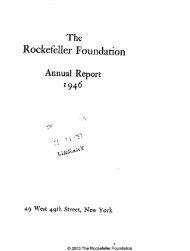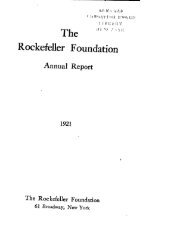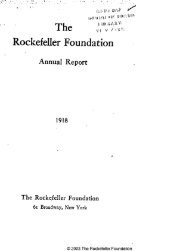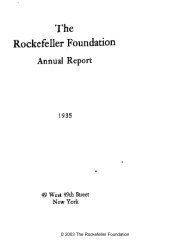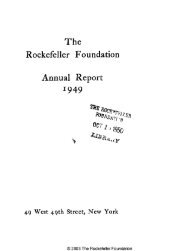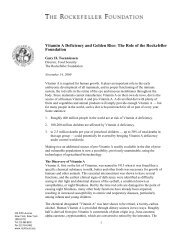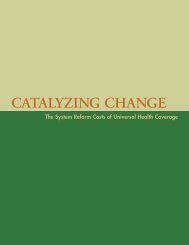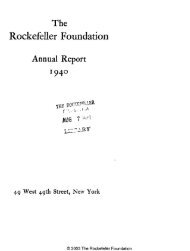Strong Ministries for Strong Health Systems - The Rockefeller
Strong Ministries for Strong Health Systems - The Rockefeller
Strong Ministries for Strong Health Systems - The Rockefeller
Create successful ePaper yourself
Turn your PDF publications into a flip-book with our unique Google optimized e-Paper software.
Introduction<br />
"<strong>The</strong> enjoyment of the highest attainable standard of health is one of the fundamental rights of every human being..." states<br />
the constitution of the World <strong>Health</strong> Organization (WHO).1 Beyond the individual right to health, the health of the population is<br />
recognized as an invaluable asset that is closely associated with social and economic development. Accordingly, progress in<br />
health is at the core of most of the United Nations (UN) Millennium Development Goals. And yet, disparities in health persist<br />
worldwide. Morbidity and mortality due to preventable causes remain unacceptably high. Nowhere is this more apparent than<br />
in low-income countries in the developing world.<br />
<strong>The</strong> health of the people is directly related to effective health systems. Strengthening of health systems has emerged as a<br />
priority in global and national health policy and practice because a gap remains between knowing what can make a difference<br />
in the health of individuals and populations, and taking action to achieve results. In order to close this implementation<br />
gap and achieve the prevention and treatment goals of traditional disease-specific programs, a comprehensive national<br />
health system that works <strong>for</strong> the entire population is needed.<br />
“<strong>The</strong> enjoyment of the highest attainable<br />
standard of health is one of the fundamental<br />
rights of every human being...” –WHO<br />
Although numerous high profile reports2 have stressed the central<br />
role of stewardship and governance in health systems strengthening,<br />
very little systematic attention has been paid to enhancing<br />
these functions. Government has a primary role in assuring effective<br />
health systems and services, whether as a direct provider, or<br />
through relationships with private providers. <strong>The</strong> ministry of health<br />
A gap remains between knowing what can make<br />
a difference in the health of individuals and<br />
populations, and taking action to achieve results.<br />
is the government agency generally responsible <strong>for</strong> the health of the<br />
people through the adoption and implementation of health policies<br />
and programs, achieved though stewardship and governance of<br />
health resources. A minister’s individual effectiveness however, is<br />
impacted by the level of institutional support the ministry receives.<br />
As ministers strive to fulfill their mandate, the role and capacity of<br />
ministries of health are too often overlooked when investments to<br />
strengthen health systems are made.<br />
A minister’s individual effectiveness is<br />
impacted by the level of institutional<br />
support the ministry receives.<br />
Through detailed interviews with those who know these issues best — the ministers and their stakeholders — this report<br />
examines the roles of health ministries, their resource needs, and the challenges they face. Based on the candid and<br />
thoughtful input of those interviewed, and the supporting research and consultation activities, this report offers seven<br />
action items geared toward building a systematic and sustained program of support <strong>for</strong> health ministries. Implementation<br />
of these proposals can help strengthen health ministries, enhance the leadership capabilities of ministers, and restore<br />
their full ability to serve as effective stewards of health resources in the drive to achieve national, regional, and global<br />
health objectives.<br />
1. Constitution of the World <strong>Health</strong> Organization, 45th edition (2006). Online at http://www.who.int/governance/en/<br />
2. World <strong>Health</strong> Report 2000 - <strong>Health</strong> <strong>Systems</strong>: Improving Per<strong>for</strong>mance (<strong>The</strong> World <strong>Health</strong> Organization, WHO, 2000); World Development Report 2004: Making Services Work <strong>for</strong><br />
Poor People (<strong>The</strong> World Bank, 2004); Opportunities <strong>for</strong> Global Initiatives in the <strong>Health</strong> System Action Agenda (WHO Working Paper No. 4, 2006); Towards Better Leadership and<br />
Management in <strong>Health</strong> (WHO Working Paper No. 10, 2007); <strong>Health</strong> Financing Revisited (<strong>The</strong> World Bank, 2006); Public Stewardship of Private Providers in Mixed <strong>Health</strong> <strong>Systems</strong><br />
(Commissioned by the <strong>Rockefeller</strong> Foundation, 2009); Closing the Gap in a Generation: <strong>Health</strong> Equity Through Action on the Social Determinants of <strong>Health</strong> (WHO Commission on<br />
Social Determinants of <strong>Health</strong>, 2008). Website addresses <strong>for</strong> reports available online are provided in Appendix 1.<br />
4 <strong>Strong</strong> <strong>Ministries</strong> <strong>for</strong> <strong>Strong</strong> <strong>Health</strong> <strong>Systems</strong>



